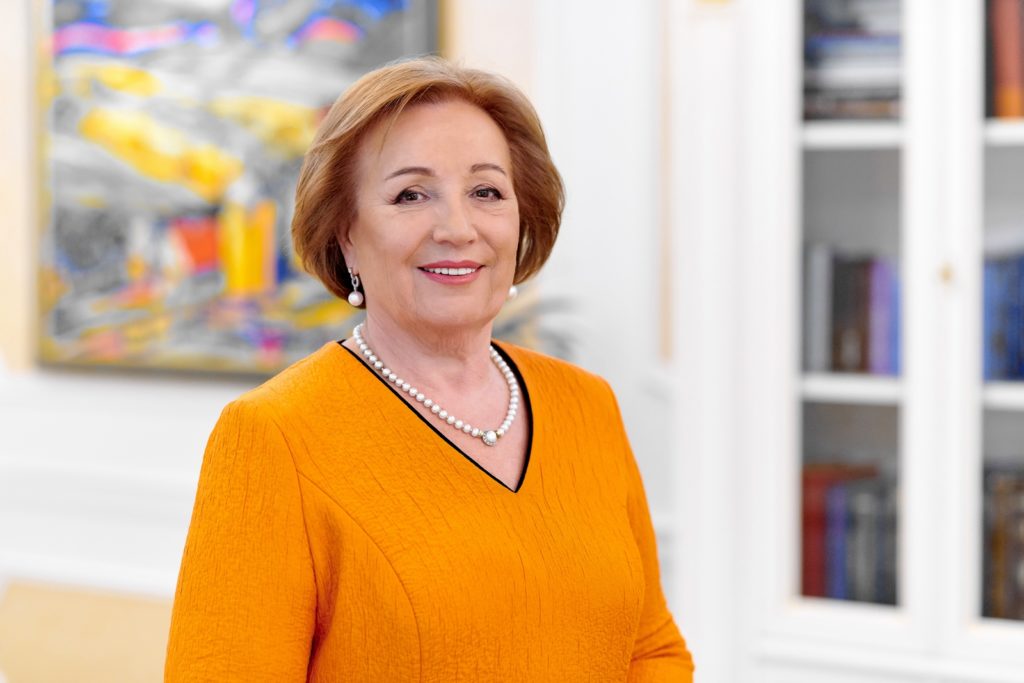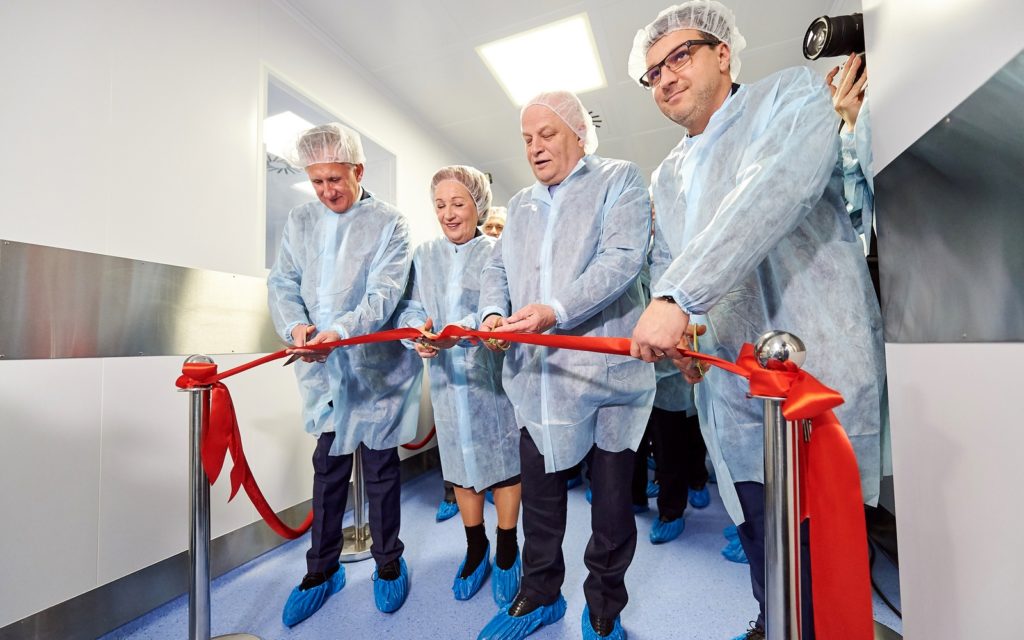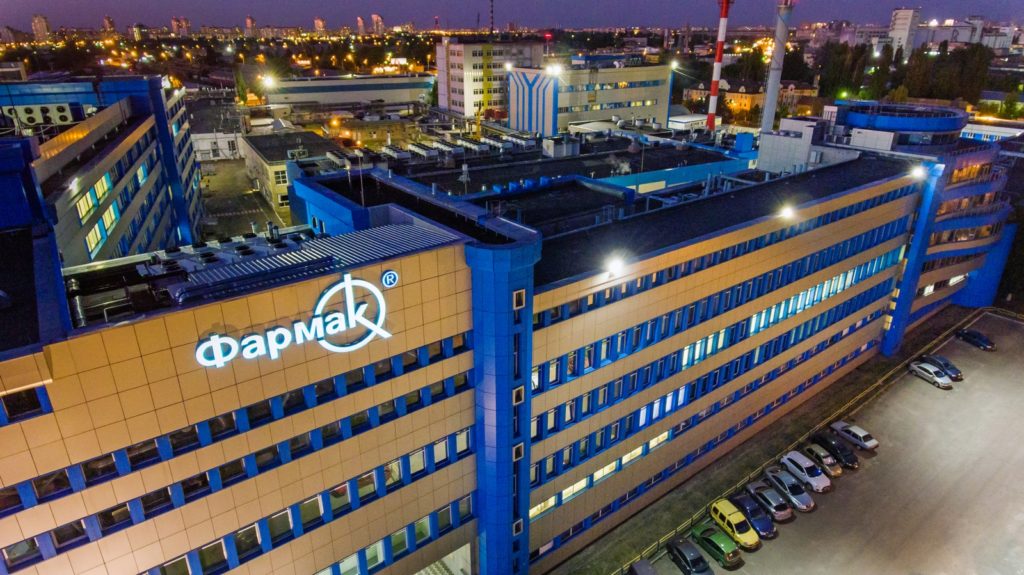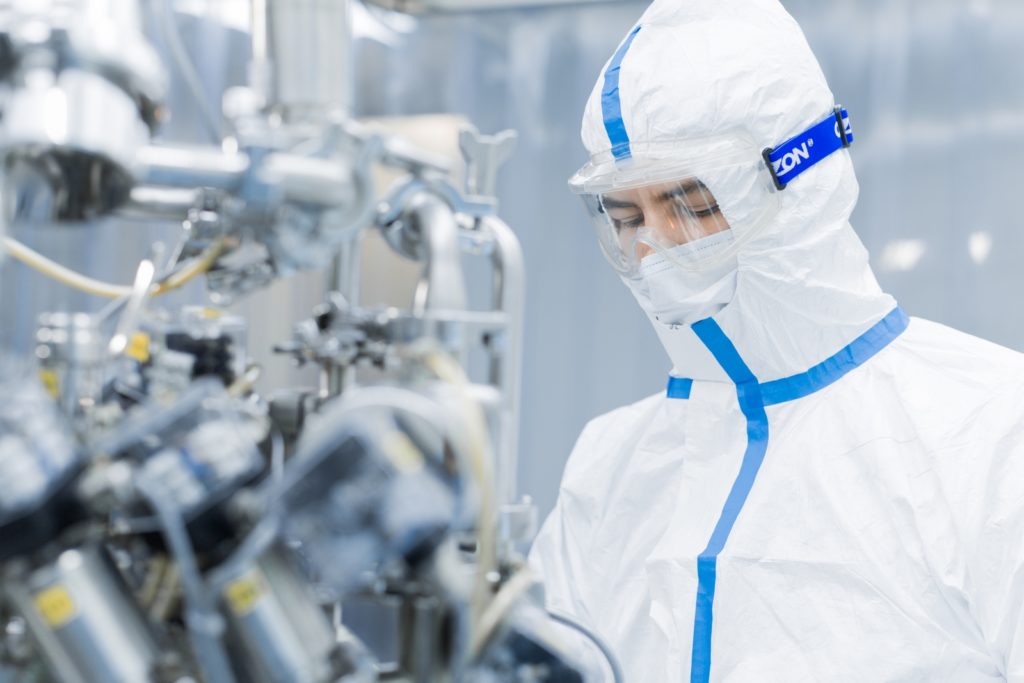


The pharmaceutical company “Farmak” harmonically corresponds to the topic of our next issue “Titans of economy”. The participants of this topic are enterprises that survived the Soviet planned economy, the depression of the 90s and the unstable conditions of modern Ukraine.
Over the past century, the manufacturing site, where Farmak plant is now located, has changed several specializations, but has preserved its integrity. Now it is not just an operating enterprise, but an industry leader with modern European equipment and technologies, which sells medicinal products far beyond Ukraine.
When we speak of “Farmak”, we mean Filya Ivanivna Zhebrovska, the owner and manager of the company for a long time. The former chief accountant of the company managed not only to restore the positions of the plant stopped in the late 90’s, but also to rebuild the management of the company, to make Farmak one of the leaders of the Ukrainian pharmaceutical industry and a worthy player in the global market.
Leadership Journey (LJ): The name of our Leadership Journey magazine was taken from a single article in Harvard Business Review. This article describes the evolution of the manager in different stages of development. Tell us about your evolution, how your team and company were created and developed, how did you grow?
Filya Zhebrovska (F.Zh.): In 1980 I was employed by the Lomonosov Kyiv Chemical and Pharmaceutical Plant, the predecessor of Farmak. Next year I will celebrate a 40-year anniversary of my work at this company.
I started my work at the company as a chief accountant, as I had economic education. Before that, I was one of the good chief accountants in the Podolskyi District of Kyiv. Just at that time the chief accountant was retired, and the new one, who was employed instead, could not cope with the work. In those days, it used to be the following way. The party said: “You must!”, we replied: “Yes!”. That was how I started to work at the plant. On the second working day, I already wanted to leave, because I saw financial losses.
The company was going through hard times: raw materials were not enough, employees did not receive bonuses. However, I was able to change the standards regarding costs and bring the work of the plant in order. In the 80’s, manufacture of hydrocortisone was launched. The modernization of the plant continued. The construction of a facility for manufacture of radiopaque contrast agents started.
In 1993, after Ukraine gained independence, we became a joint stock company, renamed the plant to Farmak and began a long-term renovation of the plant. In 1995, employees came to me and said: “Filya Ivanivna, you are obliged to be the head of the plant.” And I look at them and object: “No! I want to learn English, I want to be engaged in audit, but not to be the head of the plant”. But they insisted: “We ask you, otherwise we will remain without plant”. At that time, many enterprises of the Podolskyi District already stopped: furniture factory, slate plant, “Generator” plant. In general, manufacturing facilities stopped working. And I decided to be the head of “Farmak”.

LJ: What was your base at that time? I know that you were one of the first managers in the Soviet Union to take special courses in market economy? What did it look like?
F.ZH.: I am not a supporter of the Soviet Union, but I want to pay tribute to the fact that at that time, in the late 80’s — early 90’s, they tried to prepare us for work in market conditions. A special school was created, where chief engineers were in one group, and financiers, accountants and economists were in another. And I got from the pharmaceutical industry to a group of economists.
It was a big school, but at that time we could not even write the word “marketing” correctly. However, first we were trained in Italy on the topic: “Work of small and medium business”, “Market conditions”, “Privatization”. At the University of Bologna, special courses for specialists from the USSR were organized, where 25 participants were trained.
Then we were sent to the stock exchange, which was better developed in the United States. And in April 1992, when the Soviet Union was no longer there, we went to Japan, where we studied marketing, work with staff, ways to rationalize workplaces. Then there were courses on working with banks in France. In 1993, there were only 12 people left in our group.
LJ: What was the first challenge for you as a new manager?
F.ZH.: The main thing was to restore the work of “Farmak”. The heads and specialists of the leading institutes, which were engaged in the development of medicines in our country, said: “Who is so brave, wants to take control of the plant? It has no future.”
As soon as I headed the company, I began to form the staff. I needed a team of the strongest people in all directions. For example, if a financier, then the best, and this we could only find in the staff of the companies from the “Big Four”.
For me, the main thing was not the attitude of the team towards me, but their attitude to work – dedication and professionalism. And when a person is a skilled in his business, then our relationship with him will develop. If we talk about the style of leadership, I must admit, at first it was quite tough – it was necessary to survive, to know where to go and what to do. There was no democracy — it was necessary to launch manufacture, expand the nomenclature, save people.
If you ask, what style of management now, I will tell you — democratic. For each individual area of work should be responsible for a specific directorate, where professionals should work. And if I select people according to the “like or dislike” principle, then we will not be successful.
When people saw that Farmak pays wages on time, builds something every year, they began to come to work with great pleasure. They knew that here the working day does not end at 5 pm, but when we fulfilled the plan.
During the transformation, the quality director, manufacturing director and general director left the company. And I asked one more person to leave myself. But now we are friends with her.
LJ: What was the first thing you started to manufacture and who was your first customer? Where do Ukrainian medicines arrive now?
F.ZH.: We started with manufacture of five finished drugs and substances, which Lomonosov Kyiv Chemical and Pharmaceutical Plant produced for all pharmaceutical plants of the Soviet Union. But all 15 States, the former republics of the USSR, were disorganized, and these substances were not needed.
After some time, the same substances appeared on the market, but they were made in China. It was a strategic decision to switch to manufacture of finished products of European quality. We started to manufacture drugs that were popular among the population: drops, ointments, etc.
In parallel, we decided to launch tablet manufacture. In 1996, under the TACIS programme, 2.6 million ECU was allocated to Ukraine and Belarus (ECU, the currency used in the European monetary system of the EEC and the EU in 1979-1998 — Ed.) to create the drug L-Thyroxine, indicated for the treatment of the thyroid gland. After the Chernobyl accident and the increase in cases of thyroid disease, it was a very important medicine for Ukrainians.
In 1998, Farmak put into operation a line for manufacture of L-Thyroxine. This was the starting point in increasing the volume of manufacture of tablet forms at our company. Today, about 30% of Farmak’s products are manufactured in solid dosage forms.
In the 90’s we began to cooperate with the Poles. We supplied them with Validol. Subsequently (in 2016) we even bought a company in Poland to bring our products to the Polish market. By the way, now we export about 4 million packages of Validol there.
But at that time it was clear: in order to develop, it is necessary to switch to international quality standards. At the end of the 90s, the German government allocated funds for Ukrainian enterprises within the framework of the UNICUM program to create a quality management infrastructure based on international standards ISO 9000. It was within the framework of this program that Farmak for the first time in Ukraine developed and implemented a quality management system in which GMP standards were integrated.
At that time, we worked closely with our research institutes — the Kharkiv State scientific centre of medicines and the Institute of pharmacology and toxicology, which developed a lot of drugs that are antidotes for bacteriological weapons. For example, our antiviral drug Amizon was developed by this Institute. Farmak conducted clinical and non-clinical studies of Amizon in reputable research institutes and laboratories in Germany, the United Kingdom, the Czech Republic, the Netherlands, Switzerland and the United States, spending $20 million. During these studies, the antiviral efficacy of Amizon was discovered and proved.
Now we sell our products in Germany, Poland, retained the markets of Latvia, Lithuania, Estonia and Bulgaria. Farmak managed to enter the Vietnamese and Iraqi markets. Today we deliver products to Australia. We’re not stopping.

LJ: Please tell whether you are you or you are Farmak
F.ZH.: Farmak is me. My world and my air. I always wanted Farmak to become something more than just a business. Today Farmak is a successful company with a human face, solid reputation, values and social mission. When people ask me: “How much do you work?”. I answer: “24 hours a day.” Yes, indeed!, 22 years I worked as the Director General for 24 hours a day because there was no other way. You can’t separate the company from yourself.
LJ: But nevertheless, two years ago you moved away from operational management. When did you realize you could take this step?
F.ZH.: When I was 55, that is, the retirement age for women, I decided that I should prepare for the handover of responsibilities. It was 2006. And I moved away from operational management in 2017. And these 11 years I was preparing.
I understood that there are already new technologies and new approaches. And the young people who grew up here in the company are stronger than us. Yes, I have experience, and I understand a lot better than they do. But you don’t need to run around with a contract approval form any more — there are electronic systems for that. Information technologies that replace human labour, speed up and improve the process.
What did I do? I appointed a few people who will work without me, on their own. Someone was my advisor. Someone was appointed as the head of the unit.
We have created a security service in the company. We began to implement SAP in the Finance Department, invited the internal audit team and financiers. We have a strategy Manager.
Today, no contract is entered into the information system by one person. One person enters, another checks, and someone accepts. There are three stages of online control.
Today I am proud to say that every specialist at the plant is an expert of the European level. It is important to keep them, because they do not care where to work: here, in Latvia, or Poland. They speak English, learned all the laws of manufacture in the pharmaceutical industry by European standards. This is a new generation of people who grew up in our company. They grew up in the company that I was told about in 1995 that it had no future.
LJ: But this, of course, requires your nerves of steel. After all, much of what is happening now, you would have done differently. How do you accept these innovations?
F.ZH.: I guess quite easily. I do not look who came, what drug was delivered. Apparently 11 years of preparation was not in vain.
I prepared myself and the team. Now, Farmak employs people much younger than me. They just need to be out of the way. We have invited a number of new specialists, but 80% of managerial positions are assigned to natives of the company.
Before that, they are trained abroad, get acquainted with all the novelties in the pharmaceutical industry. And every such person is as good as gold for us. We invest a lot in them.
Today we are ranked 103rd in the list of the largest taxpayers of Ukraine. And this is true despite the fact that we are not the largest company. We employ 2,700 people. And we took that place not because taxes are big, but because we pay a decent salary to our people, which is taxed.
LJ: You travel a lot. Is it a way for you to feel freedom, or did you just never have such an opportunity?
F.ZH.: In 2010, I wondered: how much leave time do I have? It turned out — about 300 days of unused vacation. And I began to use them gradually since 2011. I could leave for 10-12 days to have rest. Usually, to the sea, to swim and get some fresh air.
I used to fly 100,000 miles a year for work. That’s a lot. Those were business trips to Europe, America, China — all in order to develop the business.
But now I bought an apartment in Madeira. I come there with great pleasure. I put on a tracksuit, a backpack and go to enjoy the beauty. Have I had this opportunity before? No, I hadn’t.
I travel a lot today. In July 2017, I got ten lessons from the driver and began to drive a car in a new way. The last time I drove a car was in 1995.
I also plan on taking dance and English classes. Last September, I went to Malta for three weeks to learn English, since there were no Russian-speaking persons around. I cannot say that I speak English fluently today. But my level is enough to communicate during my trips.
Yes, I have a calendar on my phone where I can see where and when I’m going to have a meeting, but I have a different attitude to work now. I am happy with the new team.
I do not interfere in operational management.

http://www.leadership.name/horoshij-recept-filja-zhebrovskaja-predsedatel-nabsoveta-farmak-o-kursah-dlja-sovetskih-specialistov-v-bolonskom-universitete-ljubvi-poljakov-k-validolu-i-novom-pokolenii-farmacevtov/?fbclid=IwAR2ZRBG__tW_YotliP4fFbdH1N-CS7m9EiHNe_lQB2NuBhKFoUH3snTGnP0